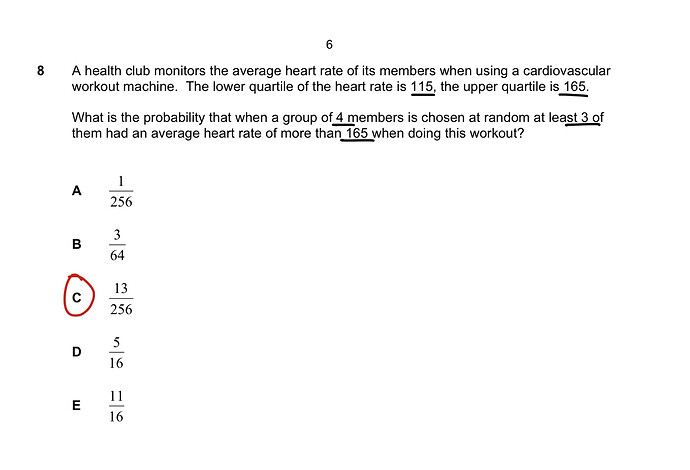Hey could someone show me the calculation to get this answer?
Hi!
Q3 = 75% of people have a heart rate of 165 or lower
so remaining 25% of people have a heart rate above 165
Propability:
1/4 * 1/4 * 1/4 * 3/4 = 3/256
1/4 * 1/4 * 3/4 * 1/4 = 3/256
1/4 * 3/4 * 1/4 * 1/4 = 3/256
3/4 * 1/4 * 1/4 * 1/4 = 3/256
sum = 12/256
BUT THERE’S A TRAP!
the question says “AT LEAST 3 of them have a high heart rate”, so we must also count for the possibility that ALL FOUR have high heart rate:
1/4 * 1/4 * 1/4 *1/4 = 1/256
Total = 12/256 + 1/256 = 13/256
Hi Juliette!
How did you know this? Is it a general knowledge?
Yes I was wondering that too!
Hi!
I know this because my highschool taught me about quartiles, i didn’t study it for the IMAT
I find it really hard to figure out what we need to learn in maths for the test even when looking at the syllabus ![]()
Ari recommends Barron’s SAT math book, i don’t read it but when i do practice problems and come across a math subject i’m not familiar with i lightly read over the chapter, i think this is the most productive way to go given that we have such a short amount of time left before the exam
Hope this helps!
Oh wait I think I get it! Quartile means 25%. So lower quartile is 25% which is 115. Then the mid quartile is the 25% between 115 and 165. The upper quartile is 165 which is another 25% which gives a total of 75%. So the remaining 25% must be over 165. I think this makes sense to me but correct me if I’m wrong!
Yes exactly!
Q1 = 0 - 25% of the data
Q2 = the median value and = 0 - 50%
Q3 = 0 - 75% (be carfeful Q3 hold all of these values in it not just the values between 115 and 165)
leaving the last quarter = 75 - 100%
quartiles are just a way to break up large data into different sections
- we usually use quartiles when dealing with large data sets
- we look at it’s difference Q3-Q1 to see its distribution along the median
- we also can choose to only deal with values between Q3 and Q1 and ignore the rest as they are our extreme low and high values that would give us a exaggerated result
Oh i got it! Thank you:)
Oh wow you’re incredible, this is an amazing explanation thank you so much xx
